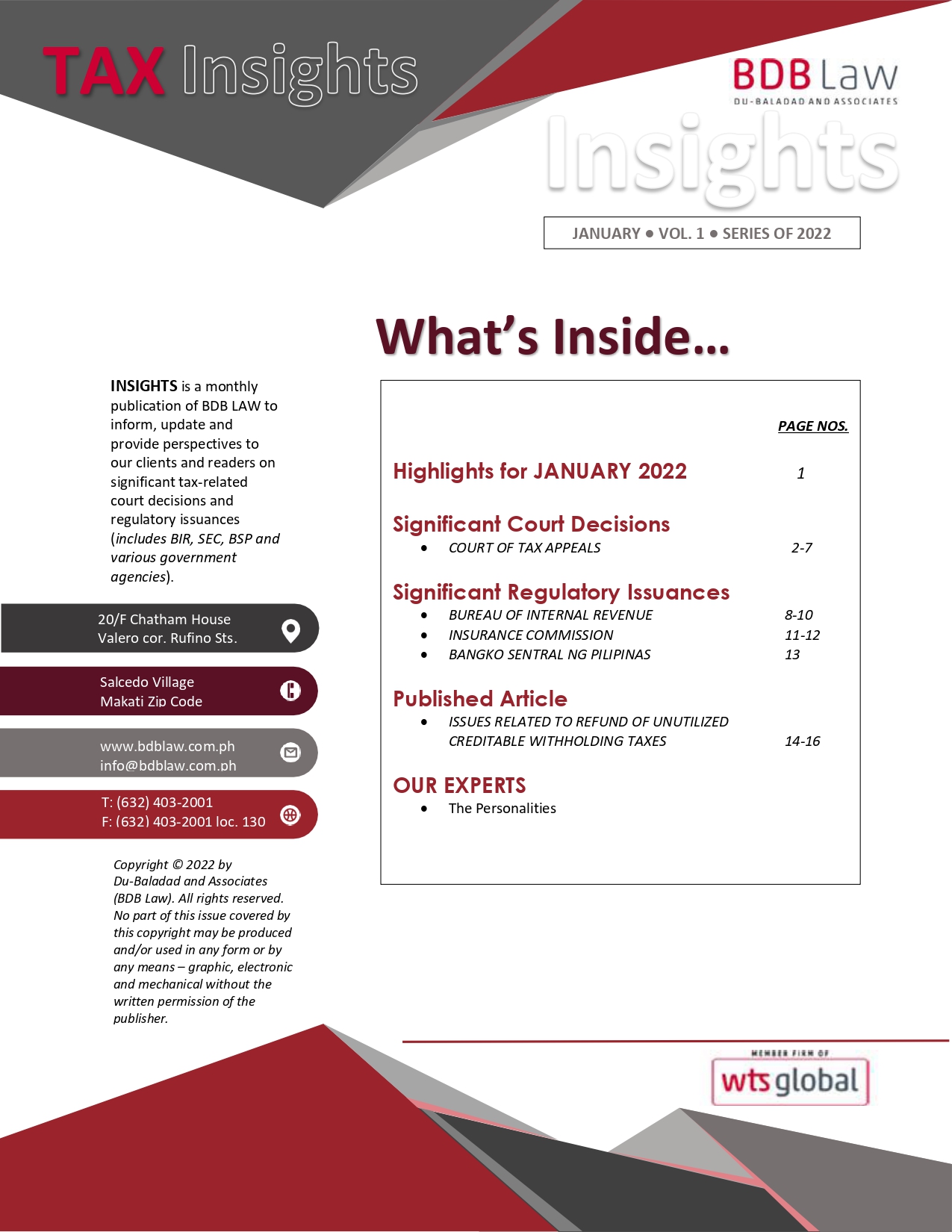


JANUARY • VOL. 1 • SERIES OF 2022
INSIGHTS is a monthly publication of BDB LAW to inform, update and provide perspectives to our clients and readers on significant tax-related court decisions and regulatory issuances (includes BIR, SEC, BSP, and various government agencies).
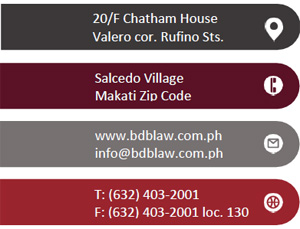
DISCLAIMER: The contents of this Insights are summaries of selected issuances from various government agencies, Court decisions, and articles written by our experts. They are intended for guidance only and as such should not be regarded as a substitute for professional advice.
Copyright © 2022 by Du-Baladad and Associates (BDB Law). All rights reserved. No part of this issue covered by this copyright may be produced and/or used in any form or by any means – graphic, electronic, and mechanical without the written permission of the publisher.
What's Inside ...
- HIGHLIGHTS FOR JANUARY 2022
- SIGNIFICANT COURT DECISIONS
- Court of Tax Appeals
- SIGNIFICANT REGULATORY ISSUANCES
- Bureau of Internal Revenue
- Insurance Commission
- Bangko Sentral Ng Pilipinas
- PUBLISHED ARTICLE
- Issues Related to Refund of Unutilized Creditable Withholding Taxes
- OUR EXPERTS
- The Personalities
- The Personalities


HIGHLIGHTS for JANUARY 2022
COURT OF TAX APPEALS DECISIONS
- A Philippine Branch or an ROHQ which is a mere extension of a foreign corporation in the Philippines cannot be a subsidiary of another foreign entity. (Commissioner of Internal Revenue vs. MSCI Hongkong Limited, CTA EB No. 2258 [CTA Case No. 9661], December 15, 2021)
- The filing of judicial claim for refund/TCC just after the lapse of one (1) day from the filing of the administrative claim before the CIR is a stark disregard of the rule requiring the exhaustion of administrative remedies since the CIR is not afforded sufficient time to pass upon the claim. (Aecom Philippines Consultants Corp. vs. Commissioner of Internal Revenue, C.T.A. Case No. 10008, December 7, 2021)
- There is no legal basis to limit the source of creditable input tax on purchases or importation of goods that actually form part of the finished products or directly used in the chain of the production only. (Commissioner of Internal Revenue v. Chevron Holdings, Inc., C.T.A. EB Case No. 2355 (C.T.A. Case Nos. 9350 & 9430), December 9, 2021)
BIR ISSUANCES
-
RR No. 20-2021, December 1, 2021 – This provides for the taxation of POGOs.
-
RR No. 21-2021, December 3, 2021 – This provides for the amendments of the provisions on VAT Zero-rating and Exemption under CREATE.
IC ISSUANCES
- IC Circular Letter CL-2021-73 dated December 27, 2021 – This provides the guidelines on requests for financial documents of regulated entities.
- IC Legal Opinion No. 2021-16 dated December 22, 2021 – This is an opinion on extended warranty sold by manufacturers.
BSP ISSUANCES
BSP Circular No. 1133, December 22, 2021 – This prescribes the ceiling/s on interest rates and other fees charged by Lending Companies (LCs), Financing Companies (FCs), and their Online Lending Platforms (OLPs).

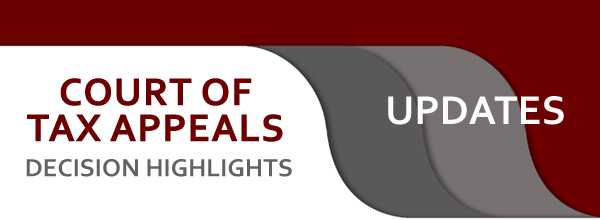
A Philippine Branch or an ROHQ which is a mere extension of a foreign corporation in the Philippines cannot be a subsidiary of another foreign entity.
The Court in Division partially granted the taxpayer’s judicial claim for refund of unutilized input VAT for the four quarters of CY 2015. Not satisfied with the decision, CIR filed a Petition before the Court En Banc. In his petition, he alleged among others, that MSCI Hong Kong Limited is wholly-owned by MSCI, Inc., thus the latter cannot be said to be a non-resident foreign corporation not doing business in the Philippines. Consequently, the services rendered by MSCI Hong Kong Limited to MSCI, Inc. is not qualified as zero-rated.
The Court En Banc denied CIR’s petition. It held that the taxpayer is the Philippine Branch or an ROHQ of MSCI Hong Kong Limited and is not a subsidiary of MSCI, Inc. In ISSI Case, it was provided that an ROHQ refers to a mere administrative arm of the mother company and they may not be treated as a separate entity. Hence, a Philippine Branch or an ROHQ which is a mere extension of a foreign corporation in the Philippines cannot be considered as a subsidiary of another foreign entity. (Commissioner of Internal Revenue vs. MSCI Hongkong Limited, CTA EB No. 2258 [CTA Case No. 9661], December 15, 2021)
For forfeiture of the subject shipment in favor of the government to be justified, there must be an intention on the part of the importer/consignee to evade the payment of the duties due.
The taxpayer imported shipment wherein the article is described as aromatic hydrocarbon. It alleged that the subject shipment is, in fact, aromatic hydrocarbon However, Respondent COC contended that the subject shipment is not aromatic hydrocarbon based on the Laboratory Report No. 08-118 issued by the NSRI and U.S. Customs and Border Protection Laboratory Report. Thus, the taxpayer misdeclared the importation of the same which warrants forfeiture in favor of the Government.
In ruling against Respondent COC, the Court found its bases insufficient and unconvincing to justify the forfeiture of the subject shipment. It held that there is no clear indication that the samples examined by the said institutions were obtained from the same imported articles of the taxpayer. Thus, the Court cannot rely on the subject Laboratory Reports.
The Court further held that without clear and convincing evidence of the alleged misdeclaration by the taxpayer, it cannot be said that there is a misdeclaration on the part of the latter, insofar as the subject importation is concerned. Further, the forfeiture of the subject shipment may not be justified since there is no showing that the subject shipment is a prohibited importation or is contrary to law, in accordance with Section 2530(f) of the TCCP, as amended. Notably, Respondent COC failed to show that the taxpayer had the intention to evade the payment of the duties due. Thus, forfeiture of the subject shipment in favor of the government is not justified under Sections 2503, and 2530 (f), (1)(3), (4) & (5) of the TCCP, as amended. (Unioil Petroleum Philippines, Inc. vs. Commissioner of Customs, CTA Case No. 9583, December 1, 2021)
The failure to perfect an appeal has the effect of defeating the right to appeal of a party and precluding the appellate court from acquiring jurisdiction over the case.
The taxpayers filed a Motion for Additional Period to File Petition for Review before the Court En Banc praying for an additional period of thirty (30) days from June 23, 2021, or until July 23, 2021 within which to file the Petition for Review. However, the Court En Banc granted an extension of only fifteen (15)
days only from June 23, 2021, or until July 8, 2021 within which to file their Petition for Review.
Despite the granted shortened extension, the taxpayers still filed the Petition for Review on July 23, 2021. Apparently, the Court En Banc dismissed the subject Petition for Review for being filed out of time. It held that perfection of an appeal in the manner and within the period laid down by law is not only mandatory but also jurisdictional. The failure to perfect an appeal as required by the rules has the effect of defeating the right to appeal of a party and precluding the appellate court from acquiring jurisdiction over the case. (Puspus, et. al. vs. Commissioner of Internal Revenue, CTA EB No. 2487 [CTA Case No. 9095], December 7, 2021)
The following documents must be secured by a RE Developer in order to qualify for VAT zero-rating: (i) DOE Certificate of Registration; (ii) Registration with the BOI; and (iii) Certificate of Endorsement from the DOE on a per transaction basis.
The taxpayer filed a claim for refund for its unutilized input value-added tax (VAT) for the 4th quarter of the taxable year 2015. According to the taxpayer, it qualifies as a generation company under the EPIRA Law engaged in zero-rated sale of renewable energy (RE).
The CTA held that the taxpayer failed to prove compliance with the second requisite for claims for unutilized input VAT requiring that the claimant is engaged in zero-rated sales. Section 108(B)(7) of the Tax Code, as further amended by the RE Act, provides that the sale of power generated from renewal energy sources by RE Developers is subject to zero-rated VAT. Sections 25 and 26 of the RE Act further provide that the DOE Certification shall serve as a basis for the entitlement of RE developers to incentives but is without prejudice to further requirements that may be imposed by the concerned agencies charged with the administration of fiscal incentives. The following documents must be secured by a RE Developer in order to qualify for VAT zero-rating: (i) DOE Certificate of Registration; (ii) Registration with the BOI; and (iii) Certificate of Endorsement from the DOE on a per transaction basis. However, no evidence was submitted showing that the taxpayer was issued a DOE Certificate of Registration or a Certificate of Endorsement from the DOE, on a per-transaction basis. (YH Green Energy, Inc. v. Commissioner of Internal Revenue, C.T.A. Case No. 9784, December 7, 2021)
The filing of judicial claim for refund/TCC just after the lapse of one (1) day from the filing of the administrative claim before the CIR is a stark disregard of the rule requiring the exhaustion of administrative remedies since the CIR is not afforded sufficient time to pass upon the claim.
On 15 January 2019, the taxpayer filed before BIR Revenue District Office a claim for refund for its excess and unutilized creditable income taxes withheld (CWT) for the fiscal year ended 30 September 2016. In view of BIR's inaction, the taxpayer filed a Petition for Review before the CTA on 16 January 2019.
The CTA ruled that the taxpayer did not give the CIR sufficient opportunity to decide the administrative claim for refund/TCC. Under Sections 204 (C) and 229 of the NIRC, a taxpayer-claimant must first file an administrative claim for refund before CIR prior to filing a judicial claim before the CTA. Both the administrative and judicial claims for refund should be filed within the two (2) year prescriptive period, and the claimant is allowed to file the latter even without waiting for the resolution of the former to prevent the forfeiture of its claim through prescription. After the taxpayer filed the administrative claim for refund/TCC before, it immediately filed the judicial claim before the CTA just after the lapse of one (1) day. Certainly, a period of one (1) day is insufficient for CIR to decide the administrative claim for refund considering that the instant claim for refund has voluminous supporting documents. These actions displayed a stark disregard of the rule requiring the exhaustion of administrative remedies which rests on the principle that the administrative agency, if afforded a complete chance to pass upon the matter again, will decide the same correctly. (Aecom Philippines Consultants Corp. v. Commissioner of Internal Revenue, C.T.A. Case No. 10008, December 7, 2021)
There is no legal basis to limit the source of creditable input tax on purchases or importation of goods that actually form part of the finished products or directly used in the chain of the production only.
The CTA Third Division partially granted the taxpayer’s claim for refund of its unutilized input VAT attributable to its zero-rated sales for the first and second quarters of TY 2015. CIR contends that the taxpayer was not able to prove its entitlement to the claim for refund or issuance of TCC as no attributability was established between the input VAT generated from its purchases vis-à-vis its zero-rated sales. CIR claims that only the creditable input taxes are refundable, and to be creditable, the input tax must come from purchases of goods that form part of the finished product of the taxpayer or the purchases must be directly used in the chain of the production.
The CTA En Banc disagreed with CIR's stance. There is no legal basis to limit the source of creditable input tax on purchases or importation of goods that actually form part of the finished products or directly used in the chain of the production only. It is doctrinal that when the words of a statute are clear and unambiguous, courts cannot deviate from the text of the law and resort to interpretation lest they end up betraying their solemn duty to uphold the law and worse, violating the constitutional principle of separation of powers.
A plain reading of Section 112 (A) of the NIRC of 1997, as amended, clearly shows that it merely states that the creditable input VAT should be "attributable" to the zero-rated or effectively zero-rated sales. There is nothing in the aforesaid Section which requires that the input VAT should be "directly" attributable to zero-rated or effectively zero-rated sales. While the words "directly" and "attributed" are found in Section 112 (A) of the NIRC of 1997, as amended, the Court En Banc finds that their use refers to situations where the creditable input VAT cannot be "directly and entirely attributed" to any transaction, in which case proportionate allocation must be made on the basis of the volume of sales. (Commissioner of Internal Revenue v. Chevron Holdings, Inc., C.T.A. EB Case No. 2355 [C.T.A. Case Nos. 9350 & 9430], December 9, 2021)
The presentation of a registry receipt, without properly identifying and authenticating the signatures appearing thereon, is insufficient in proving the taxpayer's receipt of an assessment.
The CTA Second Division declared the assessments issued against taxpayer void based on: (a) CIR’s non-issuance of the Notice of Informal Conference (NIC); (b) failure to overturn taxpayer's denial of receipt of the FAN; and (c) that the FLD does not indicate a specific due date. The CIR now claims that during the time of taxpayer's audit investigation, RR No. 18-13 removed the requirement of issuing NICs to taxpayers in order to expedite the assessment process. CIR insists that the BIR sent the FAN together with the FLD by way of registered mail. He presented a registry return receipt bearing the signature of a certain individual and the testimony of the revenue officer to prove the said assertion. As for the FLD's lack of due date, the CIR posits that the Tax Code does not require that a due date be stated in the said assessment.
The Court En Banc agreed with CIR's argument insofar as it states that the NIC, during the time of taxpayer's audit investigation, was not a requirement under RR No. 18-13. However, the registry return receipt and the testimony of the revenue officer are insufficient to prove that the FAN was indeed received by the taxpayer. The presentation of a registry receipt, without properly identifying and authenticating the signatures appearing thereon, is insufficient in proving the taxpayer's receipt of an assessment. Here, although the subject registry return receipt indicates a name and a signature, the CIR was unable to prove that the name appearing on the said document is an authorized representative of the taxpayer. Furthermore, the testimony of the revenue officer failed to establish that she has personal knowledge as to the fact of the actual mailing of the FAN. Hence, on these grounds, CIR failed to prove that the FAN was indeed served to the taxpayer. Lastly, the FLD merely states CIR's request for taxpayers to pay the deficiency tax liabilities through the authorized agent bank. It failed to even specify the exact document where the due date is supposedly shown. Thus, the FLD does not satisfy the due process requirements laid down under Section 228 of the Tax Code and Section 2 of RR No. 18-13. (Commissioner of Internal Revenue v. Nationwide Health Systems Baguio, Inc., C.T.A. EB Case No. 2264 (C.T.A. Case No. 9507), December 9, 2021)
Neither the Court nor any other person not related to the transaction can question the business discretion employed by a taxpayer regardless of the reason for including input VAT in the billed amount to its client, provided, that such business judgment was employed without bad faith.
The Court in Division partially granted the taxpayer's judicial claim for an input VAT refund. The CIR now claims that to allow the taxpayer to claim input VAT is tantamount to double recovery and unjust enrichment. Considering that the input VAT component of taxpayer's purchases of goods and services, and those paid to its sub-contractors, have been billed and passed on to its lone client, SEMPHIL, the said input VAT should no longer be subjected to a refund claim before the CIR.
The CTA En Banc held that neither the Court nor CIR has a right to interfere with how taxpayer bills its sales of services to its lone client, SEMPHIL. This is the very essence of the business judgment rule. As long as a business decision or policy was made by a corporation or its corporate officers in good faith, neither the Court nor any other unrelated person is at liberty to question its appropriateness. Neither this Court nor any other person not related to the transaction can question such business discretion employed by taxpayer regardless of taxpayer's reason for including such input VAT in the billed amount to SEMPHIL (which may be solely for the purpose of increasing its profit margin and/or to ensure reimbursement of the input VAT it paid on its purchases), provided, of course, that such business judgment was employed without bad faith. Here, SEMPHIL consented to such manner of billing when it entered into a Construction Contract Agreement with the taxpayer.
Neither does the Court En Banc find logic behind CIR's allegation that the taxpayer's act is detrimental to the government's interest. The government's interest was in no way prejudiced by the method of billing employed by the taxpayer considering that it had declared the entire amount it billed to SEMPHIL in its VAT and Income Tax returns. In fact, through the Philippine VAT system, the government has benefitted from taxpayer's pre-payment of input VAT on its purchases of goods and services that are related to its zero-rated services to SEMPHIL. (Commissioner of Internal Revenue v. S&Woo Construction Philippines, Inc., C.T.A. EB Case No. 2340 (C.T.A. Case No. 9731), December 10, 2021)

RR No. 20-2021,
December 1, 2021
This provides for the taxation of POGOs.
This provides for the implementation of the RA No. 11590 or an Act taxing POGOs.
A. Offshore Gaming Licensees (OGLS)
| OGL | Tax Treatment |
| Gaming Operations (whether Philippines based or Foreign based) |
In lieu of all other direct and indirect internal revenue and local taxes, either:(a) 5% of the Gross Gaming Revenue or Receipts (GGR); or |
| Non-Gaming Operations |
Philippine-based OGLs - Income tax of 25% of the taxable income derived during each taxable year from sources within and without the Philippines. Foreign-based OGLs – Income tax of 25% of the taxable income derived during each taxable year from sources within the Philippines. Non-gaming revenues of all OGLs shall be subject to VAT or Percentage Tax, whichever is applicable. |
B. Accredited Service Providers (ASPs)
| Income Tax |
a. ASPs organized within the Philippines – 25% of the taxable income derived during each taxable year from sources within and without the Philippines. b. ASPs organized outside the Philippines – 25% of the taxable income derived during each taxable year from sources within the Philippines. |
| VAT |
Sale of services/goods or properties by VAT-registered service providers/persons to OGLs subject to gaming tax – subject to zero-rated VAT rate: Provided, that the VAT zero-rating shall only apply if the OGLs are paying the 5% gaming tax. Provided further, that in cases wherein the services provided/goods supplied are used in non-gaming operations of the OGLs, the zero percent rate shall not apply. |
| Withholding Tax on Purchase of Goods and Services | ASPs shall withhold and remit the applicable withholding taxes. |
C. Foreign Employees of POGO Entities
- Shall have a TIN;
- Pay 25% final withholding tax on their gross income;
- The minimum final withholding tax due for any taxable month from said persons shall not be lower that P12,500.00; and
- Any income earned from all other sources within the Philippines shall be subject to income tax.
RR No. 21-2021,
December 3, 2021
This provides for the amendments of the provisions on VAT Zero-rating and Exemption under CREATE.
This amends provisions of RR No. 16-2005, as amended, to implement Sections 294 (E) and 295 (D), Title XIII of the Tax Code, as amended by CREATE Act, and Section 5, Rule 2 and Section 5, Rule 19 of the CREATE Act IRR.
On Zero-Rated Sales of Goods or Properties (Section 4.106-5) and Zero-Rated Sales of Services (Section 4.108-5)
- Persons or entities must be exempt from direct and indirect taxes under special laws or international agreements to which the Philippines is a signatory effectively subjects such sales to zero rate; and
- Zero-rating shall apply to sales of goods or properties and sales of services to a registered export enterprise, to be used directly and exclusively in its registered project or activity pursuant to Sections 294(E) and 295(D) of CREATE and Section 5 Rule 2 of its IRR for a maximum period of 17 years from the date of registration, unless otherwise extended under the SIPP; Provided that:
- the term “registered export enterprise” shall refer to an export enterprise as defined under Section 4(M), Rule 1 of the CREATE Act IRR
- is also a registered business enterprise as defined in Section 4(W) of the same IRR
- Provided further, That the above-described sales ro existing registered export enterprises located inside ecozones and freeport zones shall also be qualified for VAT zero-rating under this sub-item until the expiration of the transitory period
RR No. 22-2021, December 31, 2021
This provides extension of the deadlines for the filing of Tax Returns and Payment of the Corresponding Taxes.
In view of Proclamation No. 1267 declaring Regions IV-B, VI, VII, VIII, X and XIII under State of Calamity, this regulation:
- Provides for a 30-day extension of the deadlines for the filing of Tax Returns and Payment of the Corresponding Taxes;
- Allow affected taxpayers within the RRs and RDOs to file their returns and pay their corresponding taxes due thereon to the nearest Authorized Agent Banks (AABs) or to the BIR Revenue Collection Officer (RCO), notwithstanding RDO jurisdiction and payment thru a Revenue Collection Officer (RCO) with the issuance of manual receipt.
- Allow affected taxpayers who are mandated users of eFPS and eBIRForms are temporarily allowed to manually file their respective tax returns within the provided extended period, without imposition of penalties for wrong venue of filing of returns and taxes.
RMC No. 121-2021,
December 14, 2021
This provides for the clarification of the taxability of the interest paid by cooperatives to its member’s deposit or fixed deposits otherwise known as share capital.
This provides that under Section 11 of RMC No. 12-10, members of the cooperative are not liable to pay any tax and fee on the interest earned on member's deposits and fixed deposits (share capital). Hence, cooperatives are also not liable to withhold tax on the aforesaid interest payments to members.

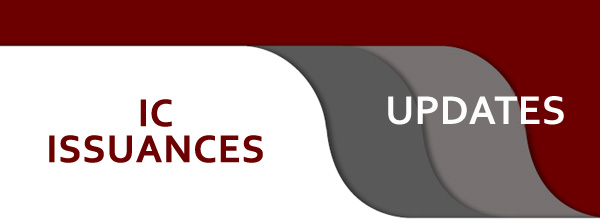
IC Circular Letter
CL-2021-72 dated December 20, 2021
This provides the guideline for the deposit of securities for companies currently in the process of complying with Section 209 of the Amended Insurance Code.
This promulgates the following in view of the on-going pandemic:
• Every insurance company that is compliant with the existing minimum paid-up capital, Net Worth and Risk-Based Capital requirements, and are currently not compliant in amount and in form of the required Security Deposit, shall be allowed to invest in government securities monthly for a period until June 30, 2022. In relation thereto, the company shall submit a sworn undertaking which shall be duly signed by the company's President and Chairman supported with a board resolution clearly stating the action taken and authorizing the said signatories.
• This Rule shall only be allowed for financial reporting periods covering the years 2019 to 2022, unless extended or changed as deemed appropriate by the Insurance Commissioner.
IC Circular Letter
CL-2021-73 dated December 27, 2021
This provides the guidelines on requests for financial documents of regulated entities.
The promulgates the guidelines on requests tor financial documents of regulated entities:
• Audited Financial Statements of regulated entities are considered public documents and are available upon request through FOI except when there is no approved synopsis by the IC.
• Quarterly Reports on Selected Financial Statistics submitted by regulated entities are considered public documents and are available upon request through FOI, with remarks that the same are unofficial and unverified financial statements, except when said QRSFS are not vet approved by the Insurance Commissioner and published in the IC's website.
• Documents submitted to the IC as attachments or are required as part of reportorial requirements but are primarily submitted to other government agencies (i.e., GIS, ITR, etc.) are not covered by this CL. Such documents shall be requested with the primary government agency tasked with the collection of such information.
• In accordance with the FOI Manual, requests for copies of the financial documents shall be made with the Records Section of the IC, subject to the submission of the following requirements, to wit:
a. Written request or duly accomplished FOI Request Form;
b. Valid identification card of the requesting party; and
c. Authorization Letter, if the request is made through a representative,
together with such duly authorized representative's valid identification card.
IC Legal Opinion No. 2021-16 dated December 22, 2021
This is an opinion on extended warranty sold by manufacturers.
This refers to clarifications on extended warranties, particularly why the IC is not requiring the manufacturers who sell extended warranty contracts to be covered by the requirements for insurance policies and whether the manufacturers can invoke the Civil Code provisions on contracts being the source of obligations.
The IC opines that extended warranty contracts sold by manufacturers are not insurance contracts under the Insurance Code, as amended. An "extended warranty" constitutes an insurance product if it falls within the definition of an "insurance contract" under Section 2(a) of the Insurance Code, as amended. In the event that not all of the elements of an insurance contract are present but merely guarantees that the product will function as claimed and promises to provide repair or replacement as necessary, such "extended warranty" operates as a warranty governed by Republic Act No. 7394 or the Consumer Act of the Philippines ("the Consumer Act"), in relation to the Civil Code.
On the other hand, an "extended warranty" which constitutes an insurance product is offered by a party other than the manufacturer or service provider, and offers coverage beyond the terms of a manufacturer/service provider's warranty. Hence, "extended warranties" which are essentially insurance products typically cover loss or damage not arising from defect in workmanship or normal wear and tear, as in the case of theft or accidental damage.
Considering that extended warranty contracts issued by manufacturers operates as a warranty governed by the Consumer Act vis-a-vis the Civil Code and not as an insurance product, such contracts do not require prior approval from the Insurance Commission before issuance. Based on the foregoing, manufacturers may invoke Civil Code provisions insofar as their extended warranties are concerned.

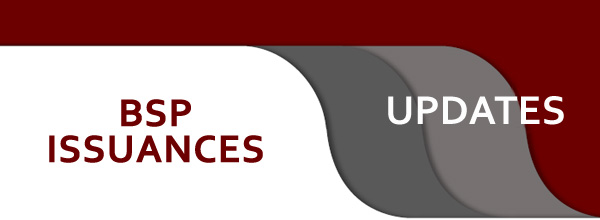
BSP Circular No. 1133,
December 22, 2021
This prescribes the ceiling/s on interest rates and other fees charged by Lending
Companies (LCs), Financing Companies (FCs), and their Online
Lending Platforms (OLPs).
The Monetary Board approved the prescription of ceiling/s on interest rates and other fees charged by LCs, FCs, including their respective OLPs, as follows:
1. A nominal interest rate ceiling equivalent to 6%/month (0.2%/day).
2. An effective interest rate ceiling equivalent to 15%/month (0.5%/day), which shall include the nominal interest rate along with all other applicable fees and charges (i.e., processing fees, service fees, notarial fees, handling fees and verification fees, among others), but excluding fees and penalties for late payment or nonpayment.
3. A cap on penalties for late payment or non-payment at 5 percent per month on outstanding scheduled amount due.
4. A total cost cap of 100% of the total amount borrowed (applying to all interest, other fees and charges, and penalties) regardless of the time the loan has been outstanding.
BSP Memorandum No. M-2021-071, December 28, 2021
This provides moratorium on the increase in transfer fees for lnstaPay and PESONet transactions.
The Monetary Board approved the moratorium on the increase in transfer fees for lnstaPay and PESONet transactions effective immediately.
Accordingly, from the date of this memorandum, PESONet and InstaPay participants are directed to maintain the transfer fees for person-to-person fund transfer via InstaPay and PESONet. The BSFIs shall continue to disclose their fees, including the waiver and reduction in fees. Relevant transfer fee that is currently waived may only be restored up to the amount of fee reported to the BSP prior to the waiver. For InstaPay and PESONet BSFI participants that do not currently impose transfer fees, to submit for prior BSP approval, any fee to be imposed on its customers for initiating fund transfers via InstaPay and PESONet. For BSFIg which have yet to offer lnstaPry and PESONet, the initial fees shall be reported to the BSP’s Payment System Oversight Department (PSOD) at least 60 days prior to the date of planned implementation.

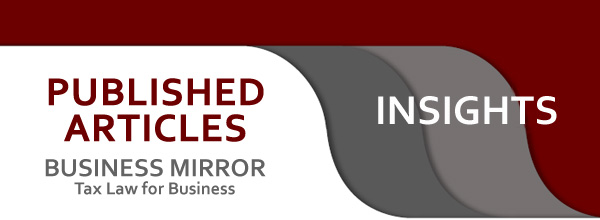
Issues Related to Refund of Unutilized
Creditable Withholding Taxes
By Atty. Mabel L. Buted
The withholding tax system is a mechanism for which taxes are collected at source as payment of the taxes due from the income recipients. Taxes withheld are advance payments as the taxes are deducted from the income and paid to the tax authority even before the income earner is required to file its tax return. The source of the income is constituted as both a representative of the income recipient for the remittance of taxes and a representative of the government for the collection of taxes. In fact, the withholding agent may be penalized for not doing that obligation.
The tax withheld may either be final tax, where the tax withheld is considered final and the income earner is no longer required to pay tax on the related income. In many instances, however, the tax withheld is simply creditable where the taxpayer is still required to include the income in computing its tax liability and apply the taxes withheld as credit. Because almost all types of income are now subject to withholding taxes, with some at high rates, it is not unusual for income earners to have excess creditable withholding taxes. The taxpayer may either carry—over those excess advance income tax payments to be utilized as credits in the future. The other remedy is to seek reimbursement through a refund.
In applying for refund, taxpayers must consider the basic requirements. These are: (a) the income upon which the taxes were withheld were included as part of the gross income declared in the returns of the taxpayer; (b) the fact of withholding is proven by withholding tax certificates issued by the withholding agents; and (c) the claim, both in the administrative and judicial levels, must be filed within two years from date of payment.
Lately, we have noticed that some deviations and concerns have been raised in relation to claims for refund for unutilized creditable withholding taxes. One of these is with respect to the exhaustion of administrative remedies, before resorting to judicial remedies, which was previously discussed by my colleague in this column. We have encountered many others and had likewise been receiving inquiries on this matter.
One of these relates to the documentary requirements. At the administrative level, some applications are being denied for failure to present the originals or the certified true copies of the withholding tax certificates. There are even instances where applications are not accepted simply because they are not accompanied by such documents. Also, while the Courts had consistently declared that proof of remittance of withholding tax by the withholding agents is not required, we still encounter applications being denied at the administrative level simply on the ground that the taxpayer fails to present proofs of remittance of withholding taxes by the withholding agent, such as the latter’s withholding tax returns and alphabetical list of income payees.
This is contrary to the pronouncements by the Courts that in a claim for refund, only the fact of withholding, and not the fact of remittance, must be proven. So the taxpayer need not show that the withholding agent actually remitted the tax withheld. The taxpayer needs only to show that its income had been subjected to withholding. It is, thus, sufficient for the taxpayer to submit the certificate of withholding (BIR Form No. 2307). Whether or not this should be the original and certified true copy is another question.
There is no specific issuance that enumerates and clarifies the requirements when applying for refund of unutilized withholding taxes. It is time to have one to properly guide both the taxpayers and the BIR examiners in dealing with refund claims. In doing so, however, practices that had already be settled through Court decisions should be respected.
On giving the administrative claim a chance to be acted upon before elevating to the Courts, the CREATE law provided for a specific period to process and decide on refund claims. But this was vetoed. So as it stands now, the law does not provide a specific period within which an administrative claim should be acted upon. The rule remains that the refund for income taxes due to excessive withholding should be filed within two years, both administratively and judicially. Hence, a taxpayer may already invoke the jurisdictions of the Courts if that period is about to lapse, even if there is no decision yet on the administrative claim.
This notwithstanding, it is a common practice for the tax authority to argue pre-mature filing of judicial claims pending the decision at the administrative level. And as noted above, there also seems to be some Court decisions holding that the claim at the administrative level should be given sufficient time to be acted upon before it is considered denied by inaction.
I agree that the tax authority should be given a chance to review applications for refund and to issue decision or before it is considered effectively denied through inaction. And we’ve seen that necessity during this pandemic. The difficulty in the preparations and filing leaves no option but for the taxpayer to file at the last minute, and to meet the 2-year period for judicial action, elevates the same to the Court after only a few days. But that’s how the law is presently crafted. And even if a period should be granted to the tax authority to review, how long would that be? The law does not say.
These are just a few of the concerns related to acclaims for refund of unutilized advance income tax payments. There are many others. Some can be addressed through administrative issuances. But others need legislative intervention. I hope that these can be addressed to provide clarity on the requirements needed from the taxpayers and on the processing of claims by the tax authorities.
----------------------------------------------
For inquiries on the article, you may call or email
ATTY. MABEL L. BUTED
Junior Partner
T: +63 2 8403-2001 local 312
This email address is being protected from spambots. You need JavaScript enabled to view it.



DISCLAIMER: The contents of this Insights are summaries of selected issuances from various government agencies, Court decisions and articles written by our experts. They are intended for guidance only and as such should not be regarded as a substitute for professional advice.
Copyright © 2022 by Du-Baladad and Associates (BDB Law). All rights reserved. No part of this issue covered by this copyright may be produced and/or used in any form or by any means – graphic, electronic and mechanical without the written permission of the publisher.






